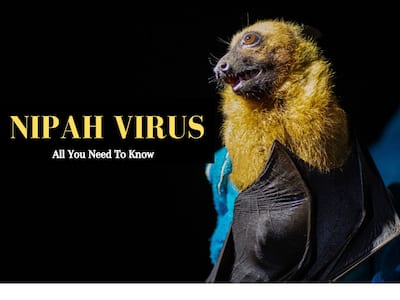
In this article, we talk about a few facts about Nipah virus which everyone must know.
Kerala is currently facing the fourth wave of the Nipah virus. The disease initially appeared in the Kozhikode district in August, leading to two fatalities. However, in the last week, at least 6 people have tested positive for the deadly brain-damaging virus in Kerala’s Kozhikode district.
Nipah virus infection is a zoonosis that is transferred when someone comes into contact with an animal or person who is infected with the Nipah virus. NiV-infected individuals who come into contact with an animal’s secretions have a significant mortality risk.
Nipah Virus Infection: All You Need To Know
Let’s know more about this virus in 10 quick pointers:
READ RELATED: 10 Unhealthiest Granolas To Avoid, According to Dietitians
- The Nipah virus is a rare but deadly virus that comes from bats. It can be contracted by humans by coming into contact with bats or their excrement, as well as by consuming tainted food or water. Sadly, Kerala has already been affected by the Nipah virus three times: in 2018, 2019 and 2021. With 21 fatalities, the 2018 epidemic was the deadliest.
- Nipah virus can be transmitted to humans from animals (such as bats or pigs), or contaminated foods and can also be transmitted directly from human to human.
- After contracting the virus, the patient may develop these signs and symptoms – headache, fever, dizziness, vomiting, sore throat, muscle ache and atypical pneumonia.
- Some of the risk factors associated with the Nipah virus include coming into close contact with infected animals like pigs, bats, or humans who have the virus. Consuming raw date palm sap carries a serious risk as well since bat excrement may be present in the date palms.
- There is no specific way to treat Nipah virus infection. According to the Centers for Disease Control and Prevention, the only current treatment for this viral infection is supportive care.
- As of date, there is no vaccine that can offer protection from the Nipah virus.
- The Nipah virus can be diagnosed using several assays. Three procedures are used by experts to determine whether a patient has Nipah virus infection: viral isolation, RT-PCR, and antibody detection by ELISA assays.
- Nipah virus-infected patients have a mortality rate of between 40% and 75% depending on the public health response to the virus, the WHO says. There is no vaccine for Nipah.
- Nipah virus can have devastating damage to the brain. Infection with NiV is associated with encephalitis (swelling of the brain) and can cause mild to severe illness and even death.
- As per studies, those who have survived the severe symptoms of Nipah infection are at higher risk of developing neurological problems such as seizures. They may even experience some personality changes.
Total Wellness is now just a click away.
Follow us on
Don’t Miss Out on the Latest Updates.
Subscribe to Our Newsletter Today!
window.addEventListener(‘load’, (event) => {
$(‘#commentbtn’).on(“click”,function(){
(function(d, s, id) { var js, fjs = d.getElementsByTagName(s)[0]; if (d.getElementById(id)) return; js = d.createElement(s); js.id = id; js.src = “//connect.facebook.net/en_US/sdk.js#xfbml=1&version=v2.3”; fjs.parentNode.insertBefore(js, fjs);}(document, ‘script’, ‘facebook-jssdk’));
$(“.cmntbox”).toggle();
});
});








